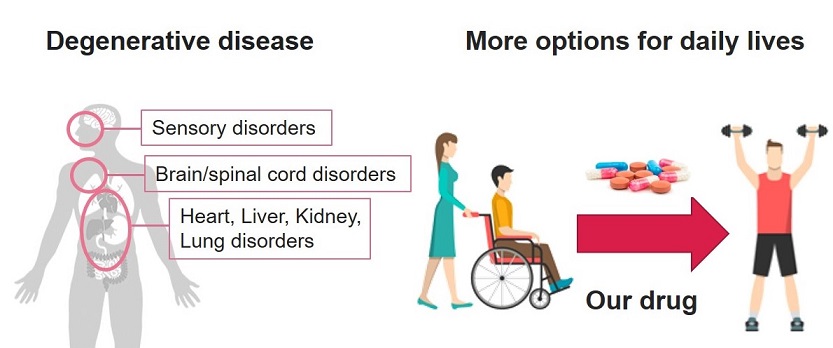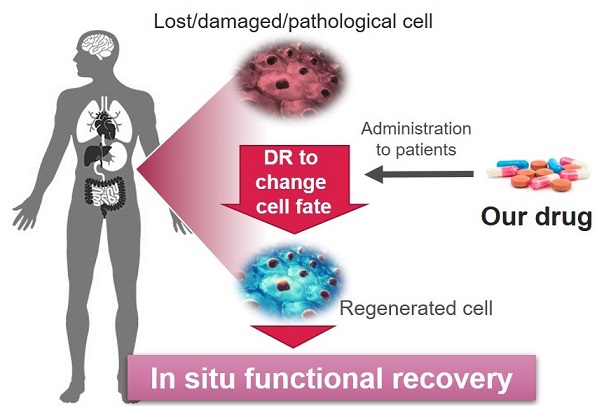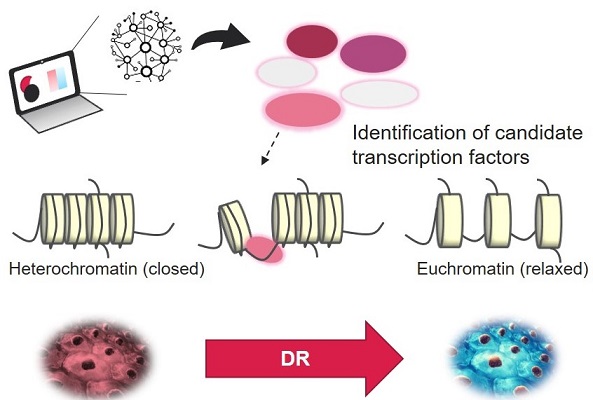
Our drug discovery research activity
The Direct Reprogramming (DR) research unit was launched at Tsukuba Astellas research facility in August 2022. Our goal is to discover therapeutic interventions that cure degenerative diseases for which treatments are very limited. Examples include, but not limited to neurodegeneration, and fibrotic disease. We hope to deliver transformative medicine to enhance patients’ independence and quality of life.

Our science
Next (re)generative medicine
Direct reprogramming is the biology that directly changes cell fate, not via pluripotent stem cells, but via modulating transcription factors. This in situ direct reprogramming method has drawn much attention as the next generation of regenerative medicine.
Unlike treatment options in the past, direct reprogramming converts damaged or pathological cells into functional cells, providing a benefit at once; eliminating damaged or pathological cells and replenishing functional cells. Thus, this biology is expected to provide transformative efficacy for incurable or debilitating disease for which no effective treatments are available. In addition, unlike exogeneous transplantation of cells, direct reprogramming regenerates desired functional cells using cells already in place in a patient’s own body, and is believed to overcome common problems seen in cell therapy, such as immunological rejection, low graft survival rate, and tumorigenic transformation.

Mechanism
Direct reprograming alters the transcriptional program that maintains cell identity. This process involves epigenetic regulation mediated by transcription factors, including DNA and histone modifications. Previously, cell fate was thought to be a one-way irreversible process. Dr. Shinya Yamanaka and others demonstrated that overexpression of a small number of transcription factors is sufficient to alter cell identity in vitro. More recent research demonstrated the feasibility of altering cell identity/lineage into another cell type of therapeutic benefit by direct reprogramming with the forced expression of defined transcription factors. For example, glial cells can be converted into functional neurons, fibroblasts into hepatocytes and cardiomyocyte, and B cells to other blood lineages such as macrophages.
Approach
① Identification of transcription factors that enable direct reprogramming from damaged and pathological cells into functional cells: Multidisciplinary approach including in silico computational technique predicts direct reprogramming factors, and collaboration study.

② Drug modality: Non-viral entities (RNA, lipid nanoparticle, etc) that deliver direct reprogramming factors to damaged and pathological cells.
③ Disease model: We aim to use rodents, non-human primates, as well as human-derived cells, to increase the translational reproducibility in the clinic, to most accurately recapitulate effectively the pathology of currently untreatable disease.

We accelerate our drug discovery research and enhance the quality of our science by incorporating interactions with academia and biotech ventures.
Team

Unit Head
Soichiro Nakahara, Ph.D.
Dr. Nakahara joined Astellas as a pharmacologist in the field of neuroscience and sensory biology and discovered 2 clinical candidates. As a member of the international consortium (ENIGMA), he leads a team, in which they evaluate relationship between pathology, disease phenotypes, and genetics (https://enigma.ini.usc.edu/). The findings were published recently. He founded the Direct Reprogramming Research Unit, which officially opened in August 2022, with filing base patents on this biology.
Press release
- Juntendo University and Astellas Establish "Direct Reprogramming Regenerative Medicine Course" for Scientific Breakthroughs.
https://www.astellas.com/en/news/17261 - Astellas and Pantherna Enter into Technology Evaluation Agreement for Research of mRNA-based Regenerative Medicine.
https://www.astellas.com/en/news/17386
Partnering
- Screening and identification of direct reprogramming factors and their validation in vitro and in vivo (Seeking partners that have a screening platform to identify direct reprogramming factors, or partners that have already identified direct reprogramming factors and need experimental validation in our systems).
- Technologies in non-viral drug entities to deliver multiple transcription factors essential for direct reprogramming or on/off control multiple transcription factor gene/activity expression (Seeking partners with linear mRNA/plasmid that can load multiple genes in tandem, circular RNAs that can load multiple gene, or others).
- Drug delivery system to transfer non-viral drugs preferentially to any purposed cells/tissues (Seeking partners with lipid nanoparticles or others capable of efficiently delivering mRNA/plasmid to fibroblasts and partners with platforms to screen Drug delivery system technology to deliver them to specific cells/tissues).
Careers
We are recruiting people who are eager to work with us and to apply direct reprogramming technology for therapeutic benefit in diseases with high unmet need. If you are interested in our activity, please feel free to contact us.